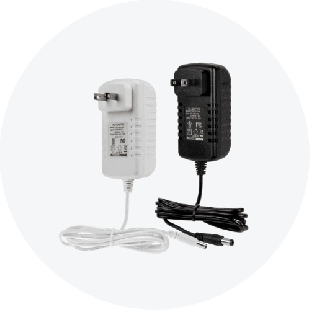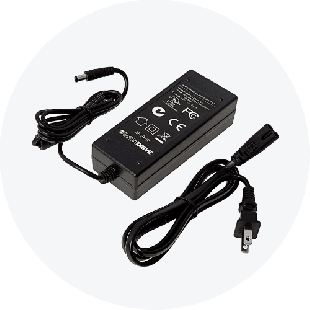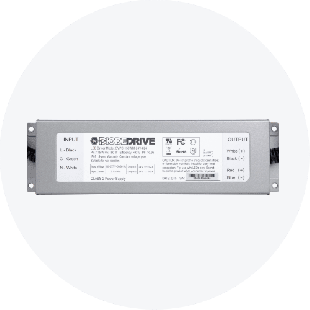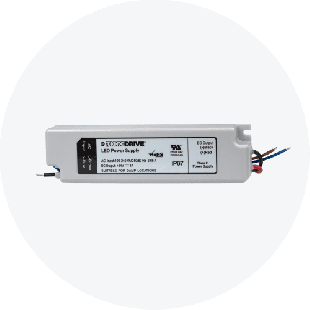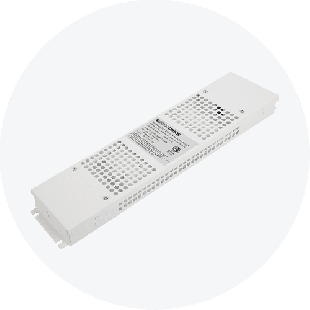What Does an AC/DC Power Supply Do?
AC/DC power supplies safely and efficiently convert higher voltage alternating current (AC) from the mains into low-voltage direct current (DC) required by many LED lights and electronic devices. Their primary purpose is to ensure that electronic equipment receives a stable and consistent DC voltage to protect components from fluctuations and surges in the input voltage. This is achieved through a circuit using a transformer to step down the voltage, rectifiers to convert the AC voltage to a DC voltage, capacitors to smooth out waveform fluctuations, and regulators to maintain a constant output voltage regardless of changes in input voltage or load conditions. Common applications include powering consumer electronics like laptops and smartphones, medical equipment, and LED lighting systems.
What Is a Switching Power Supply?
A switching power supply, or a switched-mode power supply, is a highly efficient type of AC/DC power supply. Unlike linear power supplies, which maintain a constant output voltage by dissipating excess energy as heat, switching power supplies utilize a switching regulator. This regulator switches the input voltage on and off at a high frequency to counteract fluctuation in the mains. There are various types of switching regulators, with pulse width modulation being the most common.
The order of components in a switched-mode power supply also differs from that of a linear power supply, with the current first entering a rectifying and filtering circuit, being sent to the regulator and transformer, and then being rectified and filtered once more. Read more about switching power supplies here.


How Do I Choose the Right AC/DC Power Supply?
Input Voltage
Your power supply must be rated for the input voltage of the main power line. The most common input voltages are 120 VAC for residential use and 240 VAC for commercial use.
Output Voltage
The output voltage of your power supply must meet the requirements of your LED fixture or electronic device. DiodeDrive carries power supplies with output voltages spanning from 5 VDC to 48 VDC.
Dimming
If you plan to use your AC/DC power supply with dimmable LED lights, you must also have a dimmable power supply unit. Make sure to choose a power supply that supports the dimming type of your light and any existing switches. DiodeDrive carries power supplies that are compatible with the following dimming types: 0-10V, PWM, TRIAC, and Potentiometer dimming.
Output Power
The power consumption of a power supply, or wattage, indicates the maximum power it can deliver. For optimal performance, select a power supply that supplies at least 20% more power than your application's requirements. This will help ensure proper functionality and extend the power supply's lifespan.
Water Resistance
Select a waterproof or weatherproof power supply for electronic equipment and lighting systems in outdoor and wet environments. Water-resistant power supplies ensure that all parts of your electrical system remain protected against water intrusion.
Wall and Desktop Adapters
Two common types of AC/DC power supplies are those made specifically for desktops and other wall-plugged devices. These power supplies require no rewiring and come ready to use with standard barrel-type connectors.
Enclosure Types
DiodeDrive carries AC/DC power supplies suited for a variety of applications. Our enclosed power supplies with a built-in junction box provide a clean, professional-looking option that eliminates exposed wires. Metal power supplies are suitable for various indoor or outdoor applications and provide increased durability. Plastic AC/DC power supplies are a great economical choice for safely converting and supplying power.


Compliance with Safety Standards and Certifications
Our selection of AC/DC power supplies meets the requirements for a wide range of standards and certifications to protect against short circuits, overload, and overvoltage. Power supplies that are UL Recognized, UL Listed, and ETL Listed are certified for safety and installation requirements.
Our Class 2 power supplies meet all wiring and power limitations required by the NFPA 70 National Electric Code to prevent potential fire hazards. Class II power supplies are protected against electrical shock and have sufficient insulation layers. Products with a CE label meet environmental, health, and safety standards set by European legislation. Finally, our FCC power supplies are certified to not cause interference with other electronic devices.
Why Choose DiodeDrive for AC/DC Power Supplies?
DiodeDrive is committed to providing high-quality, reliable AC/DC power supplies for a wide variety of applications. Our industry experts select only the best products for us to carry, and our in-house test lab tests every product to verify quality and specifications. Any product that doesn’t meet our high standards is not considered for sale. If you need help before or after your purchase, our dedicated customer service team is available to assist you. We also offer commercial accounts with various benefits, including flexible payment options, dedicated support advocates, and more.


